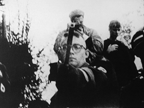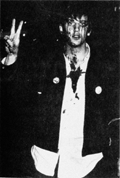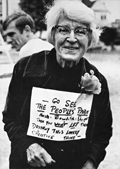Birth of Newsreel, 1968
The final days of 1967 saw the birth of a film collective in New York City, comprised mainly of young people gathering at the behest of Jonas Mekas. It was called “Newsreel.” The name’s stark simplicity reflects the intensity of their desire to topple the status quo of documentaries and social films. From the start, Newsreel assigned numbers to works based on the order of production and distribution, and the film picked for the first slot was No Game by Japanese filmmaker Oe Masanori and others. At its height, this spontaneously formed group had numerous chapters not only in New York, but also San Francisco, Los Angeles, Chicago, Boston, Atlanta and other cities. Their highly individualistic and talented members at times churned out films at the astonishing rate of one per week, which immediately made rounds to universities, churches and town halls. This selection of films from Newsreel’s inception in 1968 shows the group’s exhilarating first steps and their head-on confrontation with society.
 No Game
No Game
- 17 min / B&W / 1968 / Source: Oe Masanori
The protest march to the Pentagon on October 21, 1967 was a critical moment in the anti-Vietnam War movement. One hundred thousand citizens packed Lincoln Memorial Park, hoping to usher in a new era—among them Dr. Spock, David Dellinger, Norman Mailer and Peter, Paul and Mary. The footage shot of this demonstration sparked Newsreel’s formation, and the finished piece was distributed as Newsreel No. 1. Marvin Fishman and Oe Masanori served as editors and directors.
Jeanette Rankin Brigade
- 8 min / B&W / 1968 / Source: Third World Newsreel
In January 1968, 10,000 women marched on Washington in a peace protest against the Vietnam War. This film documents the march and raises questions about the forms of protest used by women, and the role of women in the anti-war movement.
Mill-in
- 12 min / B&W / 1968 / Source: Third World Newsreel
In a consciousness raising exercise on New Yorkers, anti-war demonstrators took to the streets of fashionable Fifth Avenue on Christmas Eve. To the dismay of shoppers, the protests snarled traffic and stunted holiday consumption.
Garbage
- 10 min / B&W / 1968 / Source: Third World Newsreel
In the midst of a prolonged strike by New York City garbage collectors, youths from Manhattan’s Lower East Side use the situation to make a political statement. They dump garbage collected from their own communities onto the grounds of Lincoln Center, creating a cultural showcase to the “Establishment.”
Boston Draft Resistance Group
- 18 min / B&W / 1968 / Source: Third World Newsreel
Profiling one of Boston’s grassroots anti-war groups, this short film documents the tactics and activities used by draft resistance organizations across the country during the Vietnam War. The group used the law to support draft resisters and educated them and their communities about alternatives to combat.
 Columbia Revolt
Columbia Revolt
- 50 min / B&W / 1968 / Source: Third World Newsreel
In April 1968, white and black students rebelled against the university administration, laying siege to five buildings and occupying the president’s office. The revolt began as a protest against university slumlording in Harlem and encroachment into neighboring communities. It was one of the first campus revolts of the civil rights/Vietnam War era. After five days of student control, the administration and trustees ordered police to clear the buildings. The result was an unprecedented display of brutality and repression. Narrated by one of the student rebels, the detailed eyewitness account of the events fueled campus revolts across the country.
 The Case against Lincoln Center
The Case against Lincoln Center
- 12 min / B&W / 1968 / Source: Third World Newsreel
More than 20,000 Latino families were displaced to make way for Lincoln Center, home to the Metropolitan Opera and the New York Philharmonic Orchestra. This film examines art patrons (corporations and wealthy families) and the culture displayed there. Juxtaposing the atmosphere of Lincoln Center with the vibrant street culture of a displaced neighborhood, the film accurately predicted the process that transformed the West Side into a high-rent area for the upper middle class.
 Black Panther
Black Panther
- 15 min / B&W / 1968 / Source: Third World Newsreel
A compelling document of the Black Panther Party leadership in 1967. This film contains a prison interview with Party Chairman Huey P. Newton as well as footage of the aftermath of the police assault against the Los Angeles Chapter headquarters, demonstrations to free Huey and a recitation of the party’s Ten-Point Platform by cofounder Bobby Seale. One of Newsreel’s most widely distributed films, it was originally released as Off the Pig.
April 27
- 10 min / B&W / 1968 / Source: Kartemquin Films
Strictly speaking the only official Chicago Newsreel production, this piece documents the Peace Parade that marched from Chicago’s Grant Park just weeks following the assassination of Martin Luther King, Jr. The 8,000 protesters were brutally attacked by the police at the parade’s end. Seen as a “dress rehearsal” for the August Democratic Convention, the confrontation further radicalized Newsreel members.
Chicago Convention Challenge
- 17 min / B&W / 1968 / Source: Third World Newsreel
Using footage taken in the midst of demonstrations during the Democratic National Convention of 1968, this film conveys the immediacy of anti-war organizing in meeting rooms, at rallies and in the streets. It is a valuable historical portrait of events that culminated in police riots against the protesters.
 Summer ’68
Summer ’68
- 60 min / B&W / 1969 / Source: Third World Newsreel
This documentary provides an in-depth examination of protests that engulfed the Democratic National Convention in Chicago. It documents draft resistance organizing, the growth of G.I. coffee houses, the development of alternative media and the early days of Newsreel itself. Particularly useful is its exploration of the problems the movement faced in using mainstream media to broadcast its message. It also documents the philosophies, tactics and problems of the student movement in the crucial year of 1968.
• Yamagata Newsreel! | Birth of Newsreel, 1968 | Women’s Newsreel | Bullet Films | Internet Activism | Newsreel Related Screenings |
